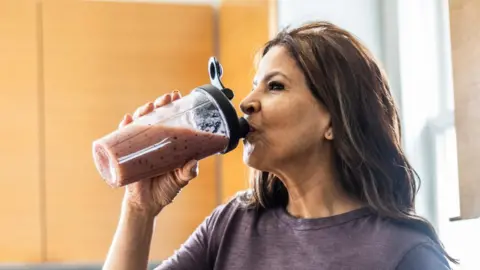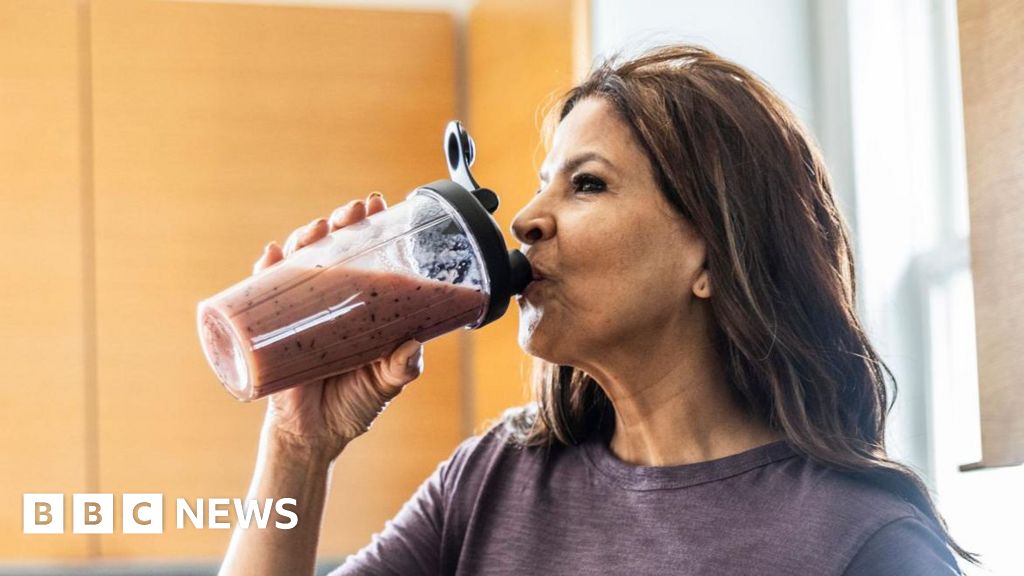NHS soup and shake diet can beat type 2 diabetes
 Getty Images
Getty ImagesPeople can reverse their type 2 diabetes by going on a strict 900-calorie-a-day liquid diet offered by the NHS.
Sticking to it may be challenging though, results suggest. Dieters must endure a few months of consuming only shakes, soups and meal-replacement bars, before healthy solid foods can be gradually reintroduced.
Of many thousands invited, hundreds completed the year-long programme, findings published in The Lancet Diabetes & Endocrinology journal reveal.
A third shed lots of weight – nearly two-and-a-half stone (16kg) – and put their diabetes into remission.
The programme is being offered to people around England. It is separate from the weight loss jab Wegovy that will be provided by some specialist NHS weight-loss management services.
Diabetes UK said people should be supported to find the approach that is most appropriate for them – whether that involves medication, dietary changes or bariatric surgery.
The shake and soup diet programme is fully funded by the NHS, so there is no cost for the individual. They get bespoke diet and exercise advice sessions in person or online, as well as support from their GP.
Experts say the opportunity can be truly life-changing for people – if they can stick at it.
Unmanaged, diabetes can increase the risk of getting other serious health problems and damage the eyes and nerves.
Dr Clare Hambling, NHS national clinical director for diabetes and obesity, said: “Obesity is one of the biggest threats to health in the UK and will be one of the biggest and most costly challenges for health systems globally, so seeing such encouraging outcomes from our programme shows that obesity can be tackled head-on.”
People are eligible if they are:
- between 18 and 65
- have been diagnosed with type 2 diabetes within the last six years
- have a body mass index (BMI) over 27 kg/m2 (if from white ethnic groups) or over 25 kg/m2 (if from black, Asian and other ethnic groups)
Only follow a very low-calorie diet if your doctor has recommended it to you.
 MARIE LAING
MARIE LAINGMarie Laing, from Frome in Somerset, told BBC News that she was able to lose more than three stone on the NHS soup and shake diet.
Mrs Laing told BBC Radio Somerset: “The GP suggested I try this after I’d tried other things myself and hadn’t succeeded, and I’m really grateful.
“This remission programme isn’t a diet – it’s a lifestyle change. Learning about your body, how food impacts you, why you crave food, how you should exercise… and it isn’t stopping you having anything.
“It’s improved my exercise and being able to be with my children and family, and being out and about and doing things that I love.”
She added: “It’s not easy, but it is well worth it to be able to have your life back.”
Another user, Juliet, told the BBC: “During the total diet replacement phase, I expected to feel hungry but I didn’t and the products actually kept me going. I enjoyed most of them too – although my particular favourites were the red Thai soup and shepherd’s pie.”
Dr Nerys Astbury, associate professor of diet & obesity at the University of Oxford, said: “We don’t know how long the remission will last, or how achieving remission can affect the risk of developing diabetes in the future. But we do know that losing weight has huge health benefits in all groups, particularly people living with type 2 diabetes.”
What is type 2 diabetes and why can losing weight help?
It is a common condition where the level of sugar (glucose) in the blood becomes too high.
It happens if the body cannot make enough of, or cannot correctly use, a hormone called insulin, which controls blood sugar.
Some cases are linked to being overweight.
That is because fat can build up in and around the pancreas – the organ that makes insulin.
Losing weight can reverse the entire process.
Type 1 diabetes, meanwhile, is an autoimmune disease that is not linked to being overweight.









